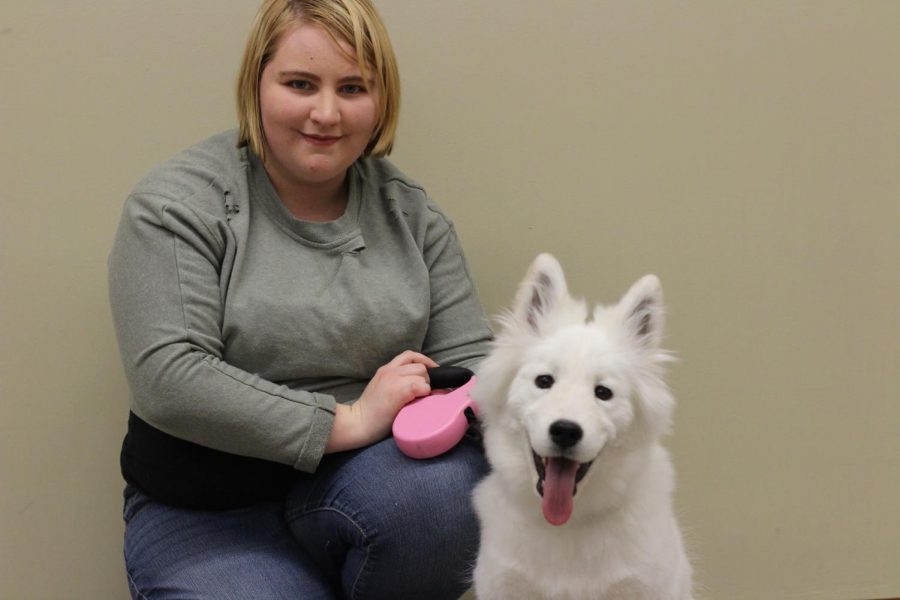Paws for Thought
The therapeutic impact emotional support animals have on human mental health
Skylar Guernsey and Honey Bear during their return visit to IU Southeast.
February 2, 2018
People with anxiety and depression are often a victim of their own mind, but with the aid of an emotional support animal, they have learned to cope and gain a companion while doing so.
Research suggests emotional support animals greatly improve a person’s mental health and have lasting effects on the human body as well. For more and more people, animals have become an essential part in de-stressing, relieving anxiety and providing comfort to their owners.
While this is not new information and many people have known that dogs aid in mental health, recent studies suggest much more might be at play. According to UCLA Health, the simple act of petting animals releases an automatic relaxation response. Animals all across the world, specifically dogs, have begun to take on the title of a therapy or emotional support animal.
For former IU Southeast student Skylar Guernsey, her five-month-old Siberian Husky, Honey Bear, helps her battle depression and anxiety on a daily basis. Honey Bear is an emotional support animal in training that often would come to campus with Guernsey when she was a student at IU Southeast.
Guernsey describes Honey Bear as an essential part of her everyday life in dealing with her chronic depression and anxiety.
“She really helps soothe my anxiety,” Guernsey said. “She’s soft so it gives you that sensation of just something tangible, something to hold onto, something that is safe.”
Guernsey describes herself as a kind person and takes delight in bringing Honey Bear on campus so other students can share her happy aura. While Honey Bear still has some training to do, Guernsey eventually plans on taking Honey Bear to places such as elderly homes and children hospitals so she can bring a smile to a few more faces.
The Psychology Behind the Paw Print
Lucinda Woodward, associate professor of psychology at IU Southeast, has some explanation of why animals offer emotional support. Woodward has published multiple articles and conference papers on companion animals and their interpersonal relationships with their humans.
According to a journal written by C. W. Von Bergen at Southwestern Oklahoma State University, emotional support animals are typically dogs and cats, but may include other animals of any species that provide support, well-being, comfort, aid or a calming influence through companionship, non-judgmental positive regard, affection and a focus in life simply by being close to their handler.
Brooke Grizzle is a student at the University of Louisville and has a registered emotional support dog named Max. Max is about three months old and is also a Siberian Husky. Grizzle registered Max as an emotional support animal due to her post-traumatic stress disorder, extreme anxiety and mild depression.
“Before I had Max, some days it would be hard for me to even get out of bed,” Grizzle said. “My depression was so bad I would lock myself in my room and sleep all day.”

As of now, Max is registered through the University of Louisville as an emotional support animal and he lives on campus in Grizzle’s dorm.
“He has a tender touch, which is noticed by others. He will melt your heart. Dogs are proven to lower your stress level. If you want to live longer, get a dog,” Grizzle said.
The Feeling of Comfort
For Karen Wells-Gibson, her dog Waylon, a six-year-old Golden Retriever/lab mix, has the important task of helping children at Norton’s Children’s Hospital, The American Red Cross, Wellstone Hospital and other places.
Waylon has his Canine Good Citizen certification and received his therapy dog license through Delta Society, which is now currently known as Pets Partners.
The motivating factor for getting Waylon certified was the passing of Gibson’s second cousin, who had been fighting a battle with brain cancer at Norton’s Children’s Hospital, formerly known as Kosairs. He was particularly smitten with Golden Retrievers who came to visit him. Gibson wanted to give back that hope to other children by bringing Waylon in hopes of lifting their spirits.

“Waylon had a sad story, we didn’t know how his life went before we got him,” Gibson said. “We wanted to bring joy to his life and give a purpose to this rescue dog.”
Woodward states that there are several psychological processes at work that explain the effects that emotional support animals have on people with underlying mental health conditions like anxiety or depression.
“One is a social psychological process—something called emotional contagion,” Woodward said. “For people with chronic hypervigilance, like vets with post-traumatic stress disorder, it is a comfort to have a constant and reliable companion like a dog, who can assure us that that car that backfired on the street is not really dangerous.”
Harvard Business Review conducted research on emotional contagion showing that people are able to “catch” feelings of others through behavioral mimicry. If you walk into a room smiling with good energy, you’re much more likely to create a culture of joy than if you wear a neutral expression. The same goes for emotional support animals with their owners.
Woodward also states that the human endocrine system comes to play with the release of the chemical, “oxytocin” (the love hormone), which is the same hormone that is released when a mother and her newborn child are bonding. Oxytocin makes us feel emotions such as love, comfort and security. Another finding in Woodward’s personal research is that not just any animal is beneficial to someone with mental health issues.
“Some people respond better to cats. Others prefer the steadfast companionship of dogs,” Woodward said.
Grizzle credits Max for giving her the motivation to get out of bed and the emotional support to get through the day.
“Max has helped me become a better version of myself mentally,” Grizzle said. “He is the reason I want to wake up.”


